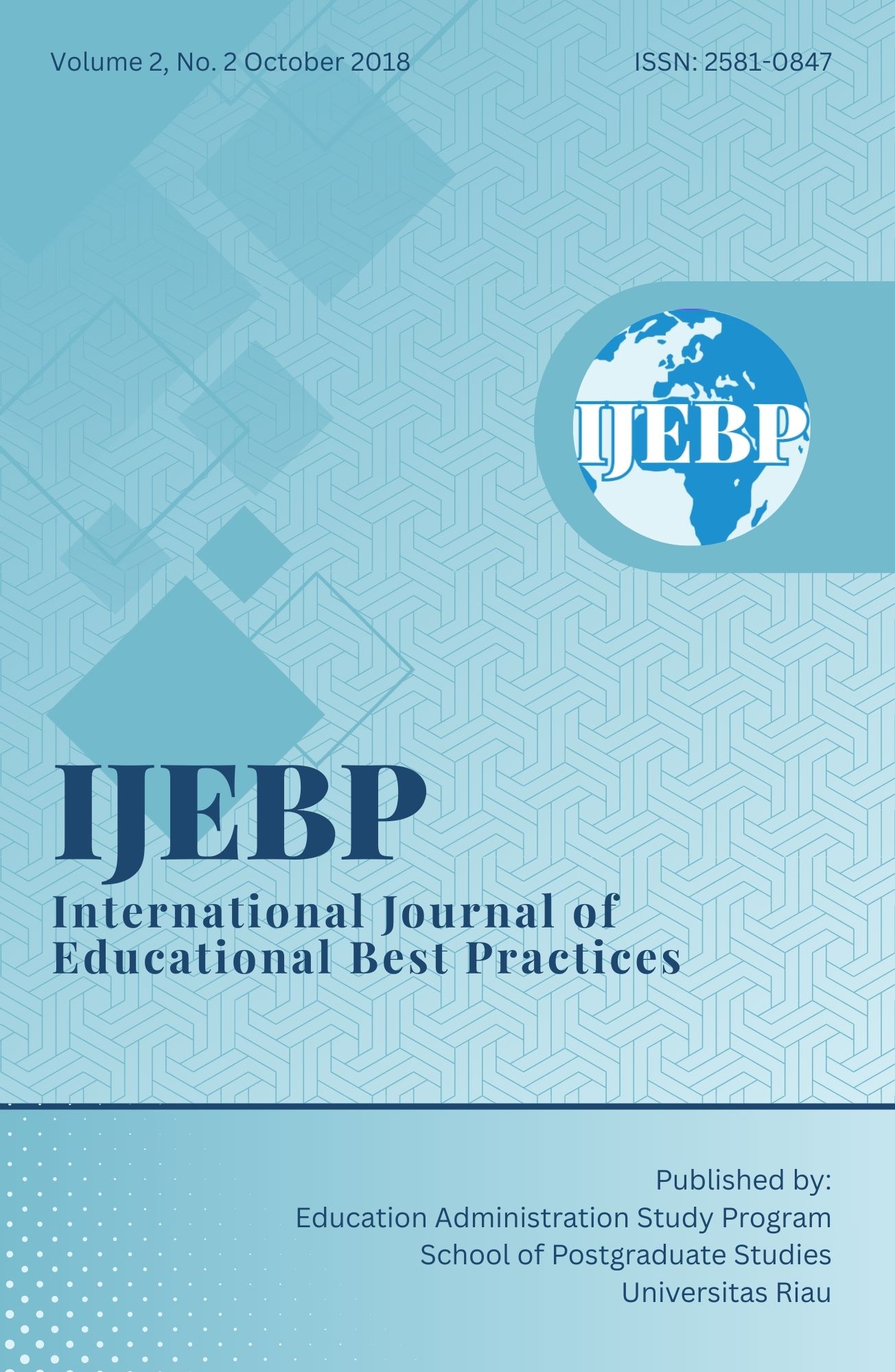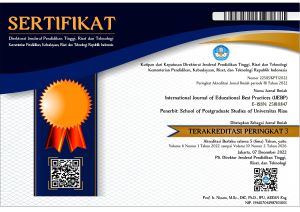ACADEMIC ADVISORS’ PERCEPTIONS OF ACADEMIC ADVISING IN PUBLIC UNIVERSITIES OF MALAYSIA
DOI:
https://doi.org/10.31258/ijebp.2.2.34-48Keywords:
academic advising, academic development, student perception, public universities, cross-site analysisAbstract
This study explored academic advisors’ perceptions toward academic advising implemented at public universities of Malaysia. Using a qualitative research design with cross-site analysis strategy approach, interviews were conducted with eight academic advisors from four Malaysian public universities. Each interview session was assisted by the interview protocol. The interview was recorded and transcribed verbatim. The qualitative data was analysed in the form of thematic analysis with the assistance of NVivo12. Several themes emerged from the initial analysis. Further analysis using several coding and themes revealed one advanced theme namely the outcomes of academic advising and four sub-themes related to student development: academic development, personal development, social development, and career development. This study found that academic development, personal development and career development were the first, second, and third themes most stated while the subtheme social development was hardly stated by the academic advisors when asked regarding their perceptions towards academic advising. The finding of this study implies that social development of students was not part of academic advising tasks of academic advisors from the perspective of Malaysian public universities.
References
Astin, A. W. (1975). Preventing students from dropping out. San Francisco: Jossey-Bass.
Astin, A. W. (1978). Four critical years: Effect of college on beliefs, attitudes, and knowledge. San Francisco: Jossey-Bass.
Astin, A. W. (1993). What matters in college. San Francisco: Jossey-Bass.
Crockett, D. S., Habley, W. R., & Cowart, S. C. (1987). The ACT national survey of academic advising: Preliminary report. Iowa City: IA: American College Testing Program.
Crookston, B. B. (1972). A developmental view of academic advising as teaching. Journal of College Student Personnel, 13(1), 12-17.
Cuseo, J. (2003). Comprehensive academic support for students during the first-year year of college. In G. L. Kramer (Ed.), Student academic services: A comprehensive handbook for the 21st century (page number). San Francisco: Jossey-Bass.
Dadgar, M., Nodine, T., Bracco, K. R., & Venezia, A. (2013). Integrating student supports and academics. San Francisco: WestEd.
Ender, S. C., Winston, R. B., & Miller, T. K. (1982). Academic advising as student development. New Directions for Student Services, 1982(17), 3-18.
Gordon, V. N., Habley, W. R., & Associates. (2000). Academic advising: A comprehensive handbook. San Francisco: Jossey-Bass.
Habley, W. R., & McClanahan, R. (2004). What works in student retention? Two-year public colleges. ACT Research Report.
Howell, N. G. (2010). Appreciative advising from the academic advisor's viewpoint: A qualitative study. PhD Dissertation. University of Nebraska.
Hunter, M. S., & White, E. R. (2004). Could fixing academic advising fix higher education? About Campus, 9(1), 20-25.
Hussin, S. H., & Tuah, K. M. (2007). Towards a quality support service: the academic advising system: a lesson from the mentor-mentee system. Retrieved on 01.03.2012 from: http://www.calm.unimas.my/calm_arc/insite_v10/article2.html
Ismail, A., Abdullah, D. N. M., & Khian Jui, M. K. (2011). Relationship between mentoring program characteristics, self-efficacy and mentee outcomes: A study of the Malaysian institutions of higher learning in Sarawak. FRGS Research Report, Universiti Malaysia Sarawak, Sarawak.
Ismail, A., & Ridzuan, A. A. (2012, March). Relationship between mentoring program and academic performance. The mediating effect of self-efficacy. In The Proceeding of the 3rd International Conference on Business and Economics Research (ICBER) (pp. 12-13).
Jayne, D. K. (2011). The role of academic advising in student retention and persistence. About Campus, 16(3), 8-12.
Kuh, G. D. (2008). Advising for student success. In Gordon, V. N., Habley, W. R., Grites, T. J., & Associate (Eds), Academic advising: A comprehensive handbook (2nd ed) (p. 68-84). San Francisco: Jossey-Bass.
Kuh, G. D., Ikenberry, S. O., Jankowski, N. A., Cain, T. R., Hutchings, P., & Kinzie, J. (2014). Using evidence of student learning to improve higher education. San Francisco: John Wiley & Sons.
Kuh, G. D., & Ikenberry, S. O. (2009). More than you think, less than we need: Learning outcomes assessment in American higher education. National Institute for Learning Outcomes Assessment.
McGillin, V. A. (2000). Current issues in advising research. In V. N. Gordon & W. R. Habley (Eds.), Academic advising: A comprehensive handbook (pp. 365–75). San Francisco: Jossey-Bass.
Nor, A. S. M., Zaini, R. M., & Zahid, S. M. (2013). Shortage of accountants: Does mentoring helps to increase the number? International conference on Social Science Research, ICSSR 2013. 4-5 June 2013, Penang, MALAYSIA.
Nguyen, T. V., Said, H., Mohd Rameli, M. R., Karim, N. A., Tajuddin, N., & Chai, T. T. (2015). Role of academic advising in mitigating the challenges of ethnic minority students at Universiti Teknologi Malaysia. International Education Studies, 8(13), 52.
O’Banion, T. (1972). Academic advising in the two-year college: A national survey. Journal of College Student Personnel, 13(5), 411-419.
Soria, K. M., & Mumpower, L. (2012). Critical building blocks: Mandatory prerequisite registration systems and student success. NACADA Journal, 32(1), 30-42.
Saba‘Ayon, N. (2015). Academic advising: Perceptions of students in a Lebanese University. IJAEDU-International E-Journal of Advances in Education, 1(2), 118-126.
Shelton, E. N. (2003). Faculty support and student retention. Journal of Nursing Education, 42(2), 68-76.
Smith, J. S. (2002). First year student perceptions of academic advisement: A qualitative study and reality check. NACADA Journal, 22(2), 39-49.
Smith, C. L., & Allen, J. M. (2006). Essential functions of academic advising: What students want and get. NACADA Journal, 26(1), 56-66.
Tinto, V. (1987). Leaving college: Rethinking the causes and cures of student attrition. Chicago: University of Chicago Press.
Wessel, J. L., Ryan, A. M., & Oswald, F. L. (2008). The relationship between objective and perceived fit with academic major, adaptability, and major-related outcomes. Journal of Vocational Behavior, 72(3), 363-376.
Young-Jones, A. D., Burt, T. D., Dixon, S., & Hawthorne, M. J. (2013). Academic advising: Does it really impact student success? Quality Assurance in Education, 21(1), 7-19.





